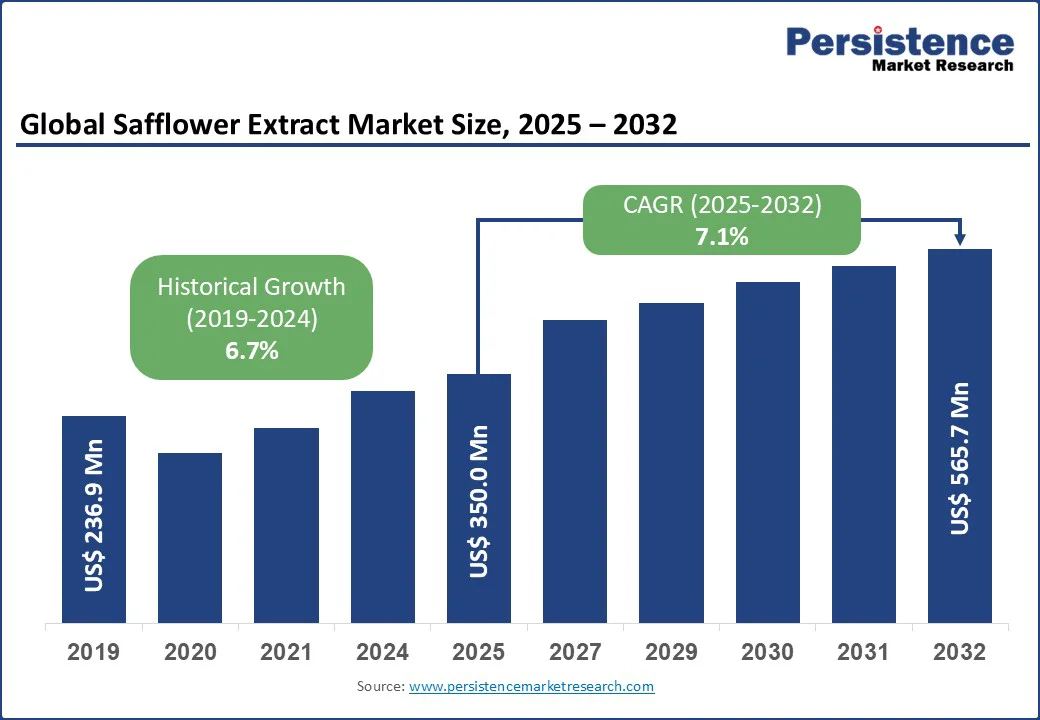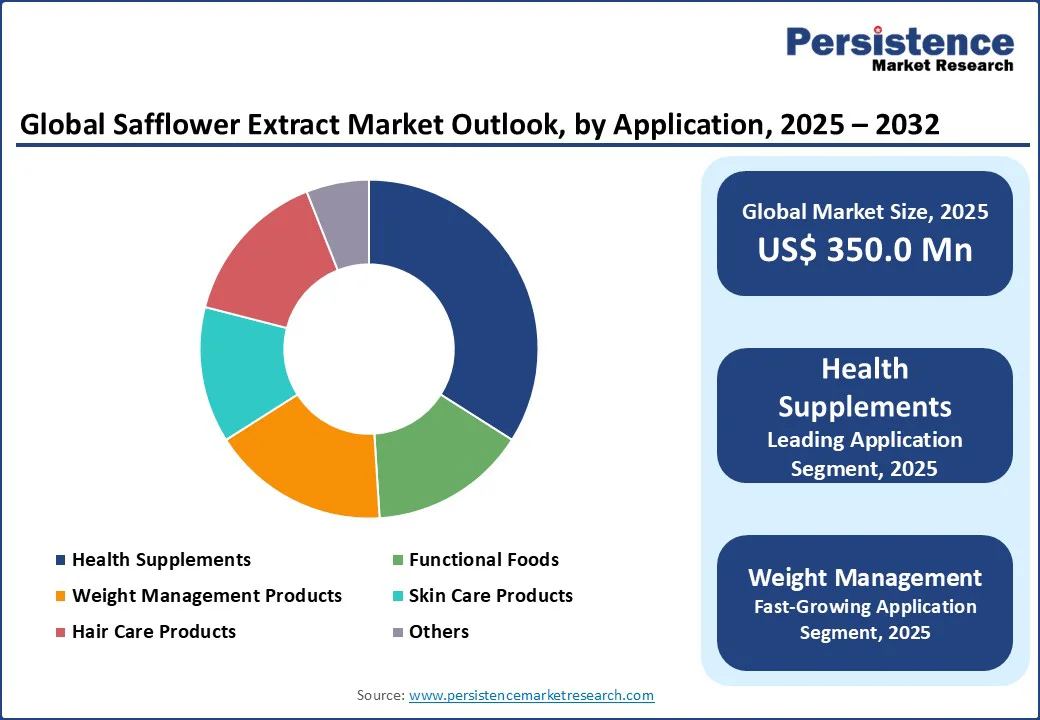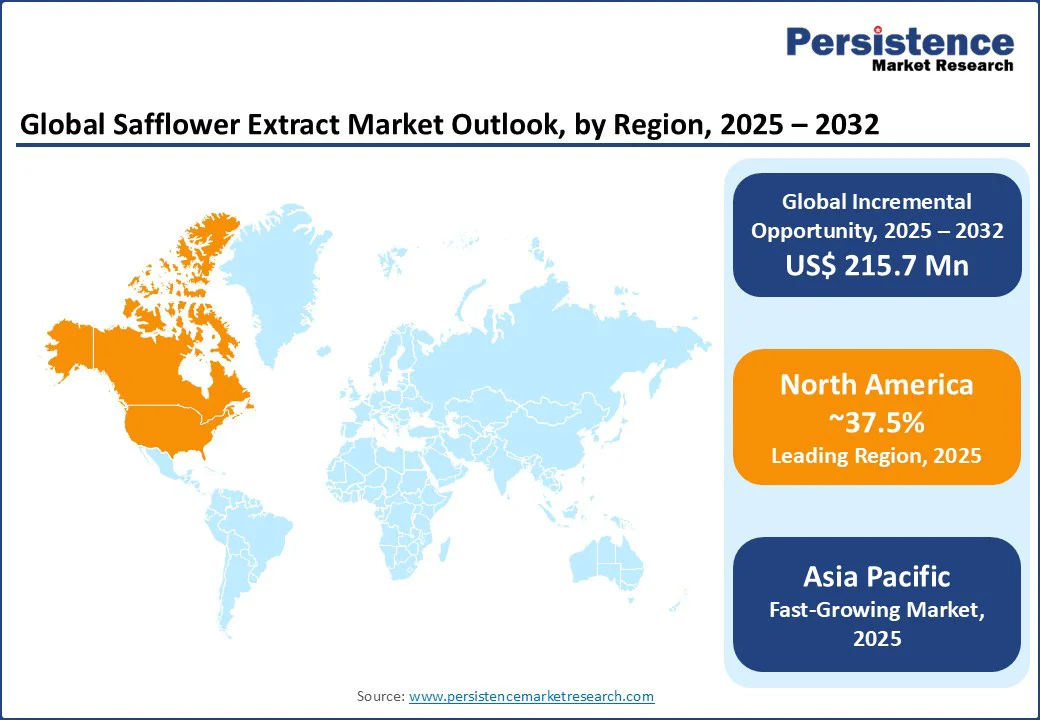ID: PMRREP11209| 186 Pages | 1 Sep 2025 | Format: PDF, Excel, PPT* | Food and Beverages

The global safflower extract market size is likely to be valued at US$350.0 Mn in 2025 and is expected to reach US$565.7 Mn by 2032, registering a CAGR of 7.1% during the forecast period from 2025 to 2032.
The market has witnessed consistent growth driven by heightened consumer awareness of the benefits of plant-based ingredients. Increasing adoption of natural health enhancers in dietary supplements and personal care products further supports this trend. Additionally, leading brands are introducing innovative formulations, aligning with clean-label preferences and sustainability, fueling market expansion globally.
Key Industry Highlights:

|
Global Market Attribute |
Key Insights |
|
Safflower Extract Market Size (2025E) |
US$350.0 Mn |
|
Market Value Forecast (2032F) |
US$565.7 Mn |
|
Projected Growth (CAGR 2025 to 2032) |
7.1% |
|
Historical Market Growth (CAGR 2019 to 2024) |
6.7% |
The safflower extract market is propelled by increasing demand for plant-based ingredients and their growing use as health enhancers in supplements and cosmetics. The global rise in vegan and vegetarian diets has driven demand for natural, plant-derived extracts such as safflower extract, known for its rich content of linoleic acid and antioxidants.
Urbanization and fast-paced lifestyles continue to drive demand for convenient, nutrient-rich products. Safflower extract is widely used in health supplements, functional foods, and skin care products for its ability to support cardiovascular health, weight management, and anti-inflammatory benefits. In markets such as the U.S., younger consumers, particularly millennials and Gen Z, are increasingly opting for plant-based alternatives to synthetic additives, boosting market growth. For instance, a 2024 survey by the Plant Based Foods Association reported that 66% of the U.S. population is engaged with plant-based foods, 77% of consumers believe sustainability is important when selecting food, 52% of consumers believe that plant-based dishes are healthier than meat-based dishes.
Government-backed nutrition programs further support market growth. In India, initiatives such as the National Nutrition Mission have promoted plant-based fortified foods through school-based and public health channels, emphasizing safflower extract’s role in addressing nutrient deficiencies among vulnerable populations, including children and pregnant women. This has led to increased institutional adoption, with public health campaigns incorporating safflower-based products in dietary programs. The expansion of the wellness and beauty industries has further driven demand. With global supplement and cosmetic production reaching new heights, safflower extract serves as a cost-effective ingredient for improving health and beauty profiles. For example, its use in anti-aging skin care products has surged due to its antioxidant properties, with brands such as Quality Product Lab Pvt. Ltd. reporting a significant increase in demand for safflower-based formulations in recent years.
The safflower extract market faces challenges due to consumer concerns about potential side effects and high production costs. Some consumers question the safety of safflower extract due to its potential to cause side effects such as bleeding disorders, allergies, or interactions with diabetes medications, particularly in high doses. A 2024 survey by the International Food Information Council found that 42% U.S. consumers avoided products with potential allergen associations, citing health risks. This skepticism restricts adoption among health-conscious demographics who prefer milder or more familiar alternatives such as fish oil or flaxseed extract.
High production costs for clean-label and premium safflower extract also hinder market growth. Incorporating high-quality raw materials, such as organic safflower seeds or leaves, significantly increases manufacturing expenses. For instance, advanced extraction methods such as cold-pressing or supercritical CO2 extraction can substantially raise production costs, according to industry estimates. These costs are often passed on to consumers, limiting accessibility in price-sensitive markets such as rural India or Sub-Saharan Africa, where affordability remains a key barrier. Additionally, the energy-intensive nature of producing high-purity safflower extract adds to operational costs, further challenging market expansion in developing regions.
The safflower extract market presents significant opportunities through innovation and sustainable sourcing. Growing demand for clean-label, non-GMO safflower extract aligns with consumer preferences for transparency and environmentally friendly ingredients. Plant-based safflower variants are gaining traction, fueled by the rise of vegan and vegetarian diets globally. Companies can capitalize by creating advanced formulations that blend safflower extract with natural compounds such as omega-3s or botanical antioxidants, catering to health-conscious and sustainability-driven consumers while meeting the needs of supplement and cosmetic manufacturers. For example, Naturalin launched a clean-label safflower oil extract line that achieved strong sales growth due to its non-GMO certification.
Sustainable sourcing is another key growth avenue. With rising global concerns about environmental impact, brands are adopting responsibly sourced safflower extracts. EPC Natural Products Co. Ltd. introduced sustainably sourced safflower seed extract in Europe, enhancing brand loyalty among eco-conscious consumers. In the Asia Pacific, companies such as Shanghai Youngsun Foods are exploring leaf-based safflower extract to reduce environmental footprints, aligning with regional sustainability goals.
The rise of e-commerce further amplifies opportunities, with online platforms, including subscription-based services and direct-to-consumer channels, becoming popular for purchasing natural ingredients. Brands are leveraging digital marketing and personalized product recommendations to engage niche consumer groups, such as fitness enthusiasts and vegan families, thereby expanding market reach and fostering consumer loyalty.
The safflower extract market is segmented into oil extract, powder extract, leaf extract, and seed extract. Oil extract dominates the segment, expected to account for approximately 48.2% of market share in 2025, due to its widespread availability and strong bioactive profile, particularly its high linoleic acid content. Brands such as Naturalin and EPC Natural Products Co. Ltd. have solidified their positions through extensive sourcing and advanced extraction capabilities. Its versatility in health supplements and skin care applications further drives adoption.
Powder extract is the fastest-growing segment, fueled by rising demand for allergen-free and sustainable alternatives. These extracts appeal to health-conscious consumers, particularly in urban areas, where they are used in functional foods and dietary supplements. Products fortified with powder extract have gained traction for their clean-label appeal and ease of integration into protein powders and meal replacements without compromising efficacy.
Health supplements are leading applications, expected to account for 34% of the safflower extract market share in 2025. Its dominance stems from widespread usage in wellness products, competitive pricing, and consumer preference for natural health benefits such as cardiovascular support and anti-inflammatory properties. Companies such as Quality Product Lab Pvt. Ltd. and New Way Herbs offer extensive safflower ranges for capsules, tablets, and powders, catering to the growing trend in wellness.
Weight management products are the fastest-growing channel, driven by the convenience of health-focused products and the rise of fitness trends. The shift toward health supplementation, accelerated by the COVID-19 pandemic, continues to drive growth in this channel. Platforms have expanded their safflower offerings in weight management supplements, providing personalized formulations for consumers seeking natural weight loss solutions.
Liquid extracts leads the formulations, expected to account for 45% of the safflower extract market share in 2025. Its dominance stems from strict regulatory compliance and widespread use in consumable and topical products. Companies such as Cibaria International and Aktivv LLP provide high-purity liquid safflower extract, ensuring safety and efficacy for health and cosmetic applications.
Capsule forms is the fastest-growing segment, driven by increasing consumer preference for convenient, pre-dosed supplements. The rise of plant-based wellness trends and the demand for portable, easy-to-consume formats have fueled growth in this segment, particularly in urban markets where capsules are popular among busy professionals and fitness enthusiasts.

In North America, the U.S. dominates the sector, holding a market share of approximately 37.5% in 2025. This is driven by high consumer spending on health and wellness products, with a growing preference for plant-based and clean-label extracts. The U.S. market is experiencing robust growth due to evolving consumer preferences and rising health consciousness. Oil-based and powder-based safflower extracts lead the category, supported by the increasing popularity of vegan diets and demand for natural health enhancers. Leading brands such as Naturalin and Quality Product Lab Pvt. Ltd. are expanding their offerings in the health supplement segment, while newer entrants are gaining traction with sustainable, non-GMO safflower extracts.
Clean-label and organic options are increasingly important to U.S. consumers. Brands such as Cibaria International and New Way Herbs have witnessed a growing popularity due to their natural ingredients and transparent formulations. Sustainability is also a major focus, with companies introducing eco-friendly sourcing practices and committing to environmentally responsible production. In the premium segment, ethical sourcing and transparency, such as the use of fair-trade safflower seeds, are emerging as key brand differentiators.
Europe’s safflower extract market is led by Germany, the U.K., and France, driven by stringent regulations and increasing consumer demand for clean-label products. Germany maintains the largest market share, with a strong focus on oil and powder-based safflower extracts. The popularity of international brands such as EPC Natural Products Co. Ltd., alongside local names, underscores this trend. Environmental policies under the EU’s Green Deal, along with restrictions on synthetic additives, are encouraging companies to adopt sustainable solutions, with liquid extracts gaining traction for supplement and cosmetic applications.
In the U.K., the industry is fueled by health-conscious millennials and Gen Z consumers who favor plant-based, low-allergen safflower extracts. Brands such as Aktivv LLP and Ramazanogullari are expanding their offerings, emphasizing transparency and natural profiles. Meanwhile, France is witnessing steady growth in weight management applications, with capsule forms leading in consumer preference. Regulatory encouragement for nutrient fortification and environmentally friendly ingredients continues to support overall market growth across the region.
Asia Pacific is expected to grow at the fastest CAGR from 2025 to 2032, led by India, China, and Japan. In India, health supplements and weight management applications dominate the industry, driven by affordability and strong support from government-backed nutrition programs such as the National Nutrition Mission. Leading players such as Shanghai Youngsun Foods and Quality Brands have broadened their portfolios with oil and powder-based options, effectively targeting both urban and rural demographics. The sector is bolstered by increasing health awareness and ongoing urbanization trends.
China’s sector is largely propelled by demand for health enhancers in functional foods and supplements. Prominent brands such as Global Oil Trading and Services and Los Charitos continue to lead the segment. The expansion of the middle class and growing interest in plant-based diets have significantly contributed to increased consumption, particularly in the health supplement category.

The safflower extract market is highly competitive, with a mix of global giants and regional players vying for market share. Companies compete on product innovation, pricing, and distribution efficiency. The rise of plant-based and clean-label products has intensified competition, as consumers demand transparency and sustainability. Digital marketing and partnerships with supplement and cosmetic manufacturers are key strategies for brand differentiation.
The safflower extract market is projected to reach US$350.0 Mn in 2025.
Rising demand for plant-based ingredients, health enhancement needs, and government-backed nutrition programs are the key market drivers.
The safflower extract market is poised to witness a CAGR of 7.1% from 2025 to 2032.
Innovation in clean-label products and sustainable sourcing are the key market opportunities.
Naturalin, Quality Product Lab Pvt. Ltd., and EPC Natural Products Co. Ltd. are among the key market players.
|
Report Attribute |
Details |
|
Historical Data/Actuals |
2019 - 2024 |
|
Forecast Period |
2025 - 2032 |
|
Market Analysis |
Value: US$ Mn, Volume: As Applicable |
|
Geographical Coverage |
|
|
Segmental Coverage |
|
|
Competitive Analysis |
|
|
Report Highlights |
|
|
Customization and Pricing |
|
By Product Type
By Application
By Formulation
By Region
Delivery Timelines
For more information on this report and its delivery timelines please get in touch with our sales team.
About Author